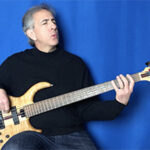Do you really need to play that?
By Jon Liebman
Week of September 6, 2021
Do you want to be a bass acrobat? Or would you rather be able to give the music what it needs?
I know, here we go again. Sure, when you hear the same thing over and over again, it doesn’t necessarily mean it’s true. In this case, however, it does. I’m talking about “chops for chops’ sake” vs. knowing what it really means to be a bass player.
I had a great conversation recently with my old friend Josquin Des Pres, published as this week’s FBPO interview. It may sound cliché to say Josquin has “done it all,” but when you consider his track record of collaborators, including Bernie Taupin, Billy Sheehan, and Stanley Clarke, as well as production credits for CBS, NBC, MTV, and the Discovery Channel, it’s safe to say that Josquin knows a thing or two about how to make music.
No doubt it will be of special interest to this audience that Josquin is also a bass player. So when I asked him what advice he had for someone who wants to learn bass, it was as if he’d already given the subject a lot of thought.
“Learn how to play with other people,” he says. “I see a lot of bass acrobats. We see them all on YouTube, and what they do is spectacular, it’s great and it’s amazing. I watch it for entertainment value.”
Granted, it is entertaining to watch what some people can do on the bass these days. It’s even inspiring. Anyone learning bass, though, will be well served to have the occasional reminder that, generally, that’s not the desired role of a bass player. More importantly, it’s not what you’ll be expected to do when playing with other people.
“It’s all about the song,” Josquin says, “and the bass is there to complement the song.” He cites Nathan East as “the most hired bass player in the mainstream world.” The point is, while Nathan’s got no shortage of chops, he only pulls them out when they actually help the song.
All the great bass players understand this concept. More importantly, they abide by it. Take Leland Sklar, for example, whose mantra has always been, “Serve the song.” Add Abe Laboriel to that list, and Neil Stubenhaus, Bob Glaub, and all the other bass greats.
“I love simplicity,” Josquin continues, “even though I came from a fusion world. I went into this simplicity kind of world because, ultimately, I think it’s the role of the bass.”
In other words, just because you can play something, doesn’t mean you should play it. Only do it if it helps the song. Otherwise, keep it simple.
No one’s saying that having chops is a bad thing. On the contrary. Having chops is important, as long as you apply them responsibly.
“So the advice is practice your chops,” says Josquin. “That’s great to get your fingers limbered. But don’t forget your role. It’s laying down the groove.”
If you want to be a bass acrobat, good luck. Or, if you want to support the band and do what’s expected of you as a bass player, then learn how to serve the song. Trust me, you’ll make everyone a lot happier, including yourself.
How about you? Have a thought on the subject? Leave a comment below and let me know what you think. In the meantime, check out my interview with Josquin here.






Yes the bass has many places in music. An important role is playing supportive bass notes for others to play upon. We’re not all Jaco who could dazzle even as an accompanist. Most of the rest of us are mere mortals. Bass is good. Like on all instruments, listen while you play.